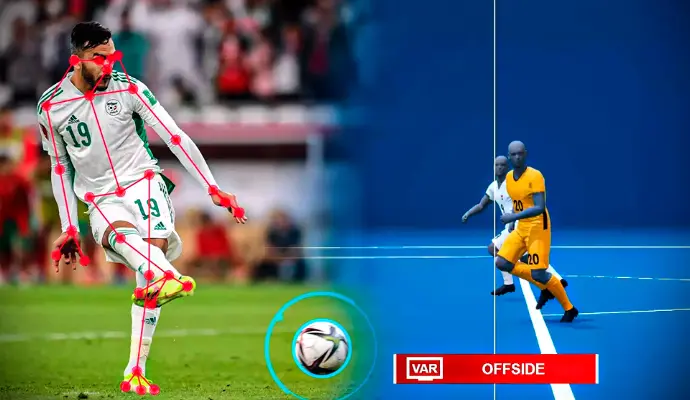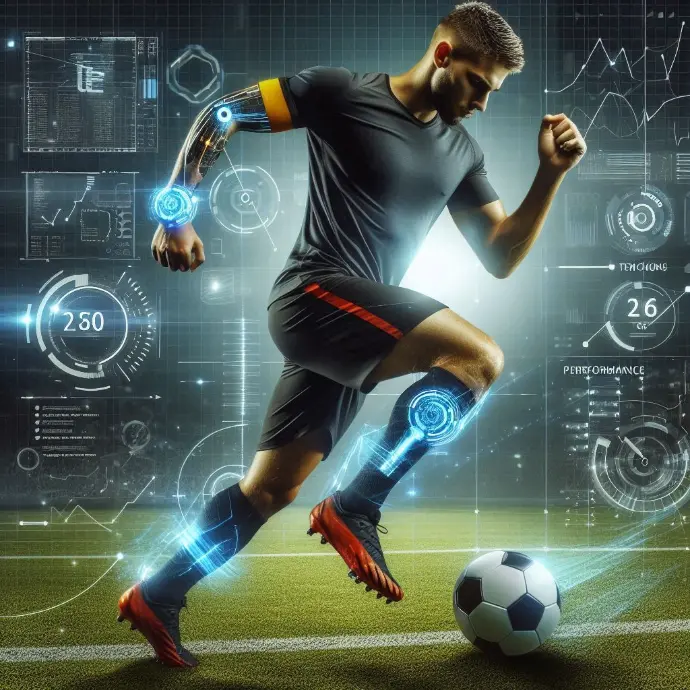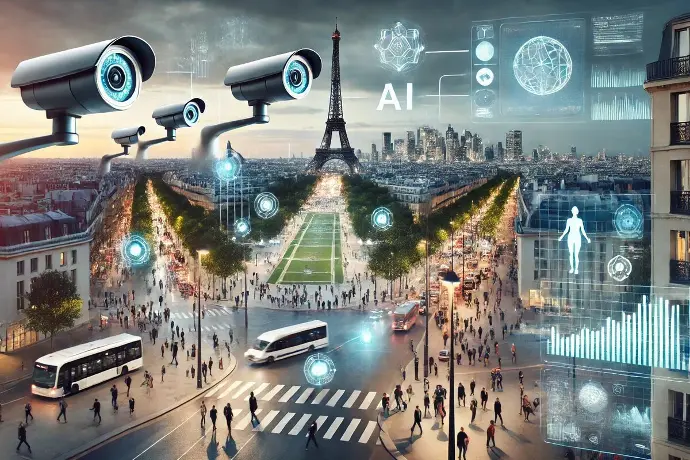Artificial intelligence in sport
Emotional intelligence can be learned and thus control emotions that are so significant in the world of sport, such as anxiety, pressure, fear (stress) and aggression, which are often disturbing and reduce performance.
Artificial intelligence (AI) is revolutionizing many sectors. One of them is the sports sector, which is being taken to a completely new level thanks to its multiple applications focused on improving, among other things, the performance of athletes and coaches. Artificial intelligence in sport is a reality that is significantly impacting many of its aspects.
In this article we are going to discover how it is used, what it is used for and what advantages this can have in the development of sport and athletes. Football, baseball, basketball and motor sports are some of the fields in which this type of system is beginning to be applied to improve professionals in the sector.
With AI, a new field has opened up for professionals who want to become specialists through a specialization course in artificial intelligence. Are you passionate about sports and programming? Keep reading! We will tell you everything you need to know about artificial intelligence in sport.
What is artificial intelligence in sport?
Artificial intelligence in sport is the application of certain techniques of this science in the sports field. In this sense, there are different tools that allow predictions to be made in the sports world about rivals and own athletes. This greatly improves the training system and, with the passage of time and the expansion of the use of these tools, it also improves sports performance.
How is artificial intelligence used in sport?
Artificial intelligence systems have come to change the way things are done in sport. In a sector that increasingly tends towards professionalization and specialization in all its areas, this type of system provides the capacity to improve efficiency and performance.
There are many different areas in the sports industry where AI is starting to play a key role. Some of them are:
- Development technology for uniforms
- Marketing
- Automated journalism
- Performance of professional athletes
- Scouting
- Medical services
- Sports refereeing

Impact of AI in sport
Many sports leagues are beginning to expand their business models thanks to AI. Thus, there are many applications and sports areas where artificial intelligence can be applied. For example, with this type of system we can calculate which parameters can affect the performance of an athlete and, with this data, medical services could develop and provide recommendations for the prevention of injuries and to avoid accumulated fatigue.
Who was the first to apply artificial intelligence in sport?
In Spain, it is said that the first to apply AI techniques in sport was Monchi. He is a former soccer player and sports director of Sevilla F.C. First, he applied this type of tools when making signings for the team. The effectiveness of these tools is proven by the sporting results of the club, which has won 6 European titles in the last 14 years of its history. A success, in part, thanks to the work with artificial intelligence tools applied to the sports environment.
Current applications of artificial intelligence in sport
These are some of the applications that artificial intelligence can have in sport:
- Performance improvement. The application of artificial intelligence systems in sport means that, as we mentioned before, an improvement in performance can occur. For example, many athletes train with devices that collect data and monitor their general health. This data can be interpreted by artificial intelligence systems and provide clues for improving sports performance.
- Training with AI. Thanks to AI systems, various aspects of the game can be controlled in training. For example, in tennis, through a combination of cameras and sensors, speed, spin and placement in a serve can be measured. This has a direct impact on the strategic decisions that coaches and technical staff may make.
- Analysis and selection of players. Perhaps this is one of the great applications of AI today. In sports like football, where there are many players and a lot of money invested, AI can help select the best talents in a much more objective way, based on data and predictions of potential, than a human scout could do.
- More objective refereeing. Increasingly, the use of cameras and image processing with Artificial Intelligence is increasingly present in different sports to serve as support when, in the middle of a match, doubts may arise about whether an infringement or referee decisions were committed.
- Investing in equipment. Monitoring the soles of shoes with sensors, AI-supported designs of lighter and more ergonomic rackets or simulations of Formula 1 race tracks with all factors taken into account allow the equipment to be amortized and made more effective.
- Cycling is one of the sports that benefits most from the use of data and analytics, as it allows not only professional cyclists but also amateurs to have valuable information to create and make better decisions in real time.
These are just some examples of how performance and efficiency in the sports field can be improved through the implementation of artificial intelligence systems. There are many more possibilities and there will be even more in the future. It is up to you to discover all the potential that AI can offer.
Applications of Artificial Intelligence in football
Football has a large investment to bet on the implementation of Artificial Intelligence and cutting-edge technologies that make this sport even more dynamic, entertaining and with more facilities to advise the referee. Learn about some of the areas where AI is already consolidated:
- VAR. This is a system of around twenty cameras that capture movement more accurately and traces of imaginary lines on the field that allow for more objective mapping of whether infractions are committed and the points where the players are located. There is a whole protocol behind the use of the Video Assistant Referee, which was implemented for the first time in 2017 and is now consolidated by FIFA. The International Football Association Board establishes that the VAR can assist the referee only in the event of a "clear, obvious and manifest error" or an "inadvertent serious incident" in relation to goal/no goal, penalty/non-penalty, direct red card or identity confusion.
- Performance analysis. Especially in professional leagues, players wear sensors to measure their biometric results in each match and this data is compared to make the most accurate predictions possible both on the field and throughout the season and even to predict a possible retirement or injury. They are powerful tools that provide immense knowledge not only to teams and coaches, but also to sports fans. They allow for suggesting changes in diet, posture, or locating weak points that can be corrected to optimize performance.
- Selection processes. Have you seen Moneyball? In addition to being a great movie, it reflects the true story of how baseball coach Bill Beane implemented statistics to measure the performance of players that no one was signing to create a star team. AI in football follows this path, but on a larger scale, working with an immense database to fit the best signings and new promises that can turn the team's results around.
- Optimizing access and security in stadiums. AI in football also allows for controlling access and mapping faces to make entrances to stadiums safer, faster, and more orderly, although it is not mandatory for those who do not want to undergo this procedure.
- User experience. AI makes it possible to create real-time graphics and cards on the screen or applications that fans can enjoy on mobile devices to immerse themselves more in the games through augmented reality.
The future of artificial intelligence in sports
Although artificial intelligence in sports is powerful, it can present ethical challenges that must be taken into consideration. In its proper balance, these are some of the possible innovations that AI will present in the sports world, based on the list prepared by Patrik Rupareliya The Future of Athletics: A Deep Dive into AI in Sports.
- Defining ethical principles. AI in sport is already beginning to take hold and allows for a more precise analysis of the effect it can have on ethics in terms of user privacy and security: we will possibly see more regulation and measures to avoid collateral damage in sport.
- Fantasy games with augmented reality. Through universes generated by AI, together with resources such as augmented reality, new platforms and interactive sports games will appear.
- Achieving fair games. AI can help detect differences and inequalities between teams and leagues to propose fairer and more equal game dynamics.
- Instant advice. It is likely that in the future we will see recommendations generated by AI for players to improve tactics and strategies, assisting the coach.
Benefits of artificial intelligence applied to sport
According to the latest research in AI, the great advantage of using this type of system in sport is that it applies a certain objectivity to the analysis of the game without having to depend on a human expert who may obtain different results depending on factors such as experience, context or knowledge.
Another of the great advantages of artificial intelligence systems in sport is the large amount of data that can be processed, since, logically, machines have a greater capacity to store and evaluate huge amounts of information.
Its application in sport caused some rejection due to the large avalanche of data that it provided and that could not be processed, but it is increasingly understood that the information provided by new technologies is more concrete and useful for athletes and coaches," Ignacio Refoyo, AI researcher at UC3M
Another of the great uses of artificial intelligence in sport is the application of techniques related to the automatic extraction of knowledge. In this case, exploiting the information that is automatically acquired from different sporting activities.
With this type of application, the great advantage is that, for example, some of the reasons why some teams win more or less could be found out. Data so that technical teams can work and reinforce the positive and correct what is wrong in the team.



Mass AI video surveillance during Paris Olympics a nightmare for privacy, activists say
They fear that the 'exceptional' rules approved for the Olympics will remain after the Games
Continue reading
 IHRO NEWS
IHRO NEWS